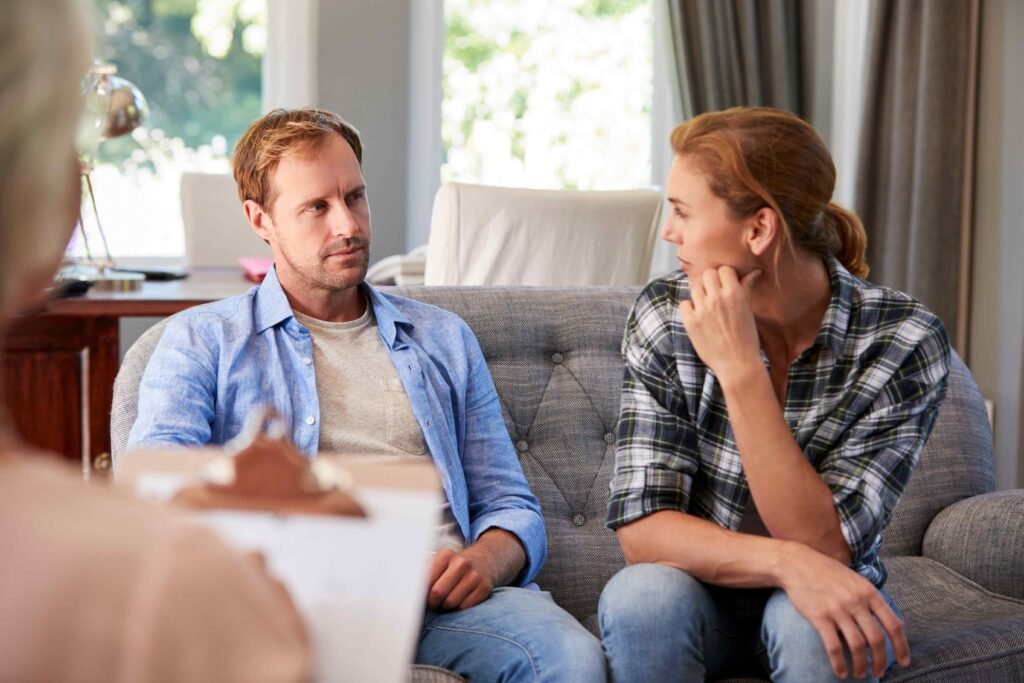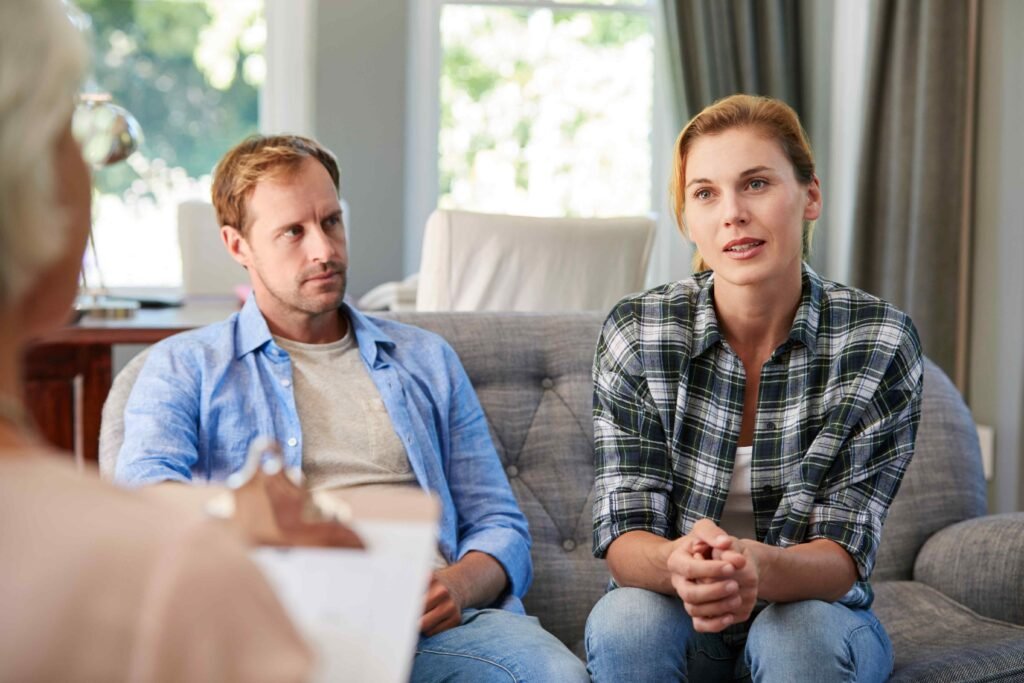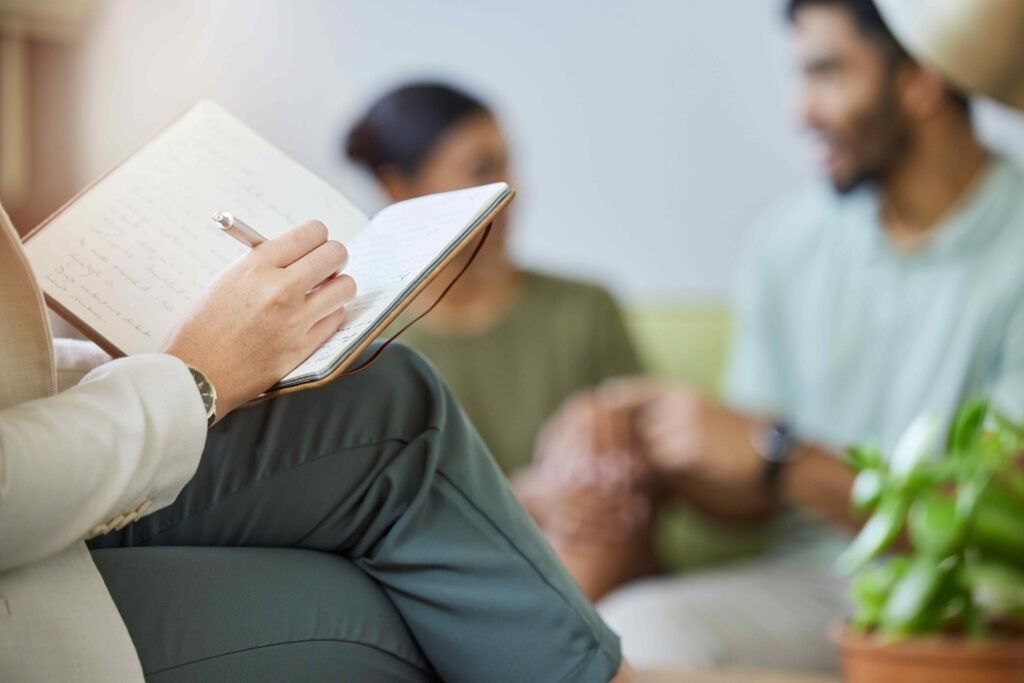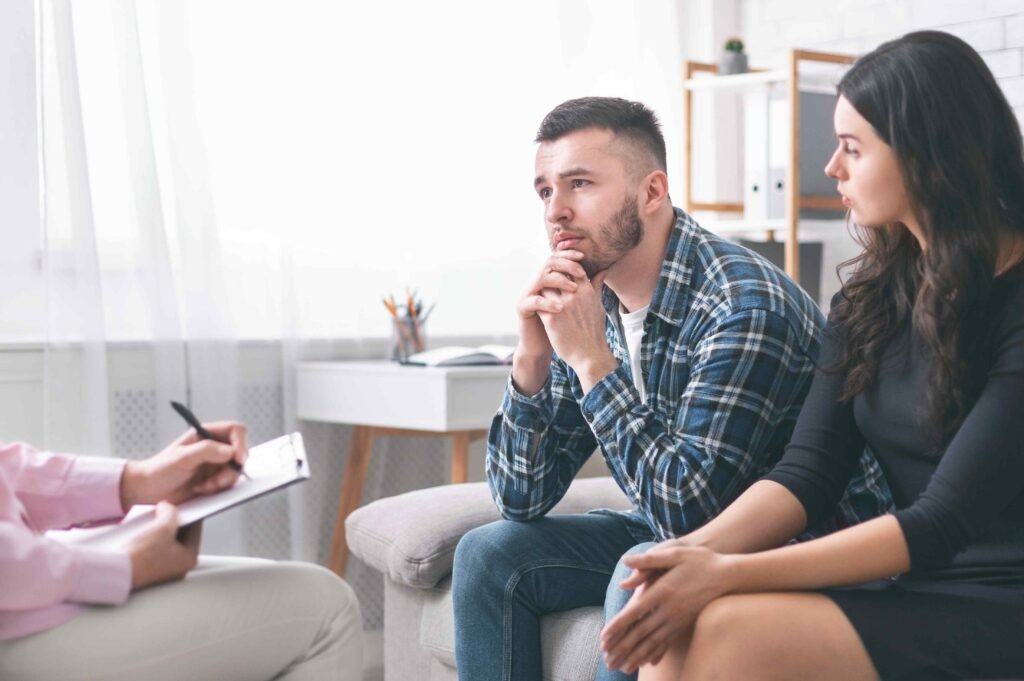Are you and your partner facing challenges in your relationship? Do you find yourselves constantly arguing or feeling disconnected? If so, couples counselling could be the solution you’ve been searching for.
At ouronlinetherapy.com, we offer expert couples counselling services in Edmonton and Sherwood Park, helping couples navigate through relationship problems and find their way back to a fulfilling and harmonious partnership. Relationships are complex, and it’s not uncommon for couples to experience difficulties at some point in their journey together. Whether you’re facing communication issues, trust issues, or struggling with intimacy, seeking the guidance of a professional therapist can provide you with the necessary tools and strategies to overcome these challenges.
Our team of experienced and compassionate therapists at ouronlinetherapy.com understands the unique dynamics of relationships and the importance of tailored solutions. We believe that every couple deserves the opportunity to thrive and create a strong foundation for a lasting partnership.
Relationships are complex, with various factors continually influencing and shaping them. Couples in today’s fast-paced world often struggle to maintain a balance between work, family, and personal time, while also nurturing their relationship. In Edmonton, many couples are facing challenges, such as communication problems, trust issues, infidelity, and the strains of everyday life, which can lead to a breakdown in their connection with one another. Recognizing the importance of seeking professional help is crucial to overcome these challenges and ensure a healthy, loving relationship. Couples counselling offers a proactive solution that can benefit countless couples and can be conveniently accessed through OurOnlineTherapy.com.

Common Issues Faced by Couples
Several common problems can create tension and conflict in a relationship, including:
– **Communication problems**: One of the most significant challenges is the inability to communicate effectively with one another. Poor communication often leads to misunderstandings, unresolved conflicts, and resentment, weakening the foundation of the relationship.
– **Trust issues**: Trust is vital to any healthy relationship. When trust is compromised due to dishonesty, infidelity, or deceitful behaviour, it can be tough to rebuild it, leading to emotional distance and insecurity in the partnership.
– **Infidelity**: Betrayal of trust through cheating can cause irreparable damage to a relationship, shaking its foundation, and leading to a world of hurt, anger, and disappointment.
– **Balancing life’s responsibilities**: Managing work, family, social life, and personal interests can be overwhelming, putting enormous strain on the relationship and preventing couples from dedicating the necessary time and attention to one another.
These problems can create significant stress in relationships and may lead to their breakdown if not addressed or managed effectively. Couples counselling offers a platform for them to tackle their issues together by seeking guidance from a professional therapist.
The Benefits of Couples Counselling
Couples counselling offers a safe and judgment-free environment, providing the opportunity to explore the depths of their relationship, understand one another better, and find ways to overcome their issues. Some key benefits include:
– Improved communication skills, helping couples express themselves more effectively and empathetically.
– Conflict resolution techniques that foster a constructive and solution-oriented approach.
– Enhanced self-awareness and increased understanding of one another’s needs and priorities.
– Developing and maintaining trust within the relationship.
– Strengthening emotional bonds and reigniting passion and intimacy.
– Tools for managing stress and balancing life’s responsibilities.
An experienced and licensed therapist can help couples navigate their journey towards healing and rebuilding a strong, loving relationship.


Why Choose Couples Counselling?
Couples counselling offers a safe and supportive space for you and your partner to address your concerns, improve communication, and gain valuable insights into your relationship. Here are some key areas where relationship therapy can help:
1. Communication: Effective communication is the cornerstone of a healthy relationship. Couples counselling can help you and your partner learn how to express yourselves openly, listen actively, and resolve conflicts in a constructive manner.
2. Conflict Resolution: Disagreements and conflicts are inevitable in any relationship. However, it’s how we navigate these conflicts that determine the strength of our bond. Through couples counselling, you’ll learn essential conflict resolution skills that can minimize the negative impact of disagreements and foster compromise and understanding.
3. Rebuilding Trust: Trust is essential for a strong and thriving relationship. If trust has been broken, whether through infidelity or other breaches, couples counselling can provide a structured process to rebuild trust and create a solid foundation for the future.
4. Enhancing Intimacy: Intimacy goes beyond physical attraction. It’s about emotional connection, vulnerability, and feeling truly seen and understood by your partner. Relationship therapy can help you and your partner explore ways to deepen your emotional and physical intimacy, reignite passion, and strengthen your bond.
How to Choose Best Couples Counsellor In Edmonton ?
Choosing the best couples counsellor in Edmonton involves a number of factors that each couple should carefully consider in order to ensure the best fit for their unique needs.
- Qualifications and Experience: The counsellor should possess relevant academic qualifications in psychology, therapy, or counselling, and a substantial amount of experience in couples counselling. They should be registered with a professional association and adhere to a code of ethics.
- Specialization: Some therapists specialize in certain areas. If you and your partner are dealing with specific issues such as infidelity, communication struggles or blended family challenges, you might want to look for someone who has experience and success in these areas.
- Approach and Techniques: Different therapists may use different therapeutic approaches or methods such as Cognitive Behavioral Therapy, Gottman Method, Emotionally Focused Therapy etc. Research these methods and discuss with potential therapists to find what approach might work best for you.
- Compatibility: As a couple, you need to feel comfortable with your counsellor. Their personality and style should resonate with you both, making it easier to open up and be honest during sessions.
- Logistics: Consider practical details such as the location of the therapist’s office, availability of online sessions, scheduling flexibility, and fees. It’s important to find a counsellor whose services fit your budget and schedule.
- Reviews and Recommendations: Check reviews and ask for recommendations. Client testimonials and reviews can provide insight into a counsellor’s effectiveness and style.
Remember, a good couples counsellor can guide you through difficult times and equip you with the skills to build a stronger, happier relationship.

Mukesh Mishra
Clinical Therapist
Our team of specialists is dedicated to helping individuals and couples address their relationship issues. Meet Mukesh Mishra who holds Master’s Degree in Clinical Social Work. As a registered Clinical Social Worker and Certified CBT and DBT Therapist, Mukesh brings a wealth of knowledge and expertise to his practice. With additional training in EMDR and Mindfulness-Based Counseling, he provides a holistic approach to couples counselling. With over five years of experience in private practice and community addiction settings, Mukesh is committed to making a positive impact in the field. Join us on this journey towards a healthier and happeir family life!
What Counselling Techniques are used by Counsellors in Coupes counselling ?
Counsellors utilize a variety of techniques during couples counselling, each designed to help partners navigate their emotional and relational landscape more effectively.
- Active Listening: This technique involves the therapist encouraging each partner to openly express their thoughts and feelings, while the other partner attentively listens without interruption. This fosters understanding and empathy.
- Emotionally Focused Therapy (EFT): This approach seeks to identify and address the emotional responses that underlie problematic patterns of interaction, fostering a stronger emotional bond between partners.
- Gottman Method: Rooted in research on couple stability, this method emphasizes the development of effective communication skills, conflict resolution strategies, and shared meaning in relationships.
- Cognitive Behavioral Therapy (CBT): This therapy helps couples recognize and change negative patterns of thought and behavior. It encourages healthier communication and problem-solving strategies.
- Narrative Therapy: This technique assists couples in separating their identities and their relationship from their problems. This helps them to view issues from a different perspective, enabling more productive conversations.
- Solution-Focused Therapy (SFT): Rather than focusing on past problems, this approach encourages couples to envision their desired future and work collaboratively towards achieving it.
These are just a few of the techniques employed in couples counselling. The best approach often depends on the unique dynamics and challenges of each couple. A professional counsellor can help identify the most effective techniques for a given situation.
How to prepare for first couple’s counselling session ?
Preparing for your first couple’s counselling session can feel daunting, but with a little forethought and preparation, it can be a smooth and productive experience.
- Set Clear Expectations: Discuss together what you hope to achieve from counselling. This could include improving communication, rebuilding trust, or resolving specific issues. Having clear expectations will help guide the process and foster constructive dialogue.
- Open Mindset: Approach the session with an open mind. Be prepared to listen, share, and explore new perspectives. This mindset will facilitate understanding and growth.

- Emotional Preparation: It’s common to feel a range of emotions before a counselling session. Acknowledge these feelings and remember that it’s okay to be vulnerable. The therapy room is a safe space for expressing feelings.
- Think About Your Relationship: Spend some time reflecting on your relationship. Consider the aspects you appreciate and those that you would like to improve. This reflection can provide a useful starting point for discussions during the session.
- Prepare to Take Responsibility: Change requires effort from both partners. Be prepared to take responsibility for your part in the relationship dynamic and be open to making changes.
- Practical Preparation: Make sure you know the time, location, and mode (in-person or online) of your session. Arriving in a relaxed and punctual manner will help the session start on a positive note.
Remember, it’s completely normal to feel a little nervous about your first session. Your counsellor understands this and will guide you through the process. Ultimately, the goal is to create a stronger, healthier relationship, and this first step is an important part of the journey.
Is online counselling with ouronlinetherapy.com effective for couples counselling ?
Online counselling with ouronlinetherapy.com has proven to be a highly effective form of couples counselling. It offers flexible scheduling, overcoming geographical barriers, and providing a comfortable and familiar environment for the sessions, which is especially beneficial for those who might feel anxious in traditional therapy settings. The platform’s therapists are highly skilled in various counselling techniques and approaches, providing personalized care to each couple. Furthermore, studies have shown that online therapy can be just as effective as face-to-face sessions, particularly when it comes to improving communication skills and resolving conflicts. However, it’s important to remember that the effectiveness of therapy often depends on the dedication and commitment of the individuals involved.
How do I book book appointment with a couples counsellor at ouronlinetherapy.com ?
Booking an appointment with a couples counsellor at ouronlinetherapy.com is a simple process. First, visit the website and navigate to the ‘Book an Appointment’ section. Here, you’ll find a list of available counsellors, their specializations, and their available slots. Choose the counsellor who fits your needs and click on the preferred time slot. You’ll be redirected to a secure page where you can fill in your personal details and payment information. Once this process is complete, you will receive an email confirmation of your appointment. Note that all information provided is confidential and is only used for the purpose of providing the counselling service. Remember, if you have any questions or need assistance during the booking process, customer support is available to guide you.
What is the Couples Developmental Approach?
The Couples Developmental Approach is a comprehensive framework that combines attachment theory, differentiation, and neuroscience to understand and navigate the different stages of a long-term relationship. It acknowledges that a relationship evolves through distinct phases and provides guidance on how couples can effectively deal with the challenges that arise during each stage. The approach identifies four key stages:
1. The Honeymoon: This initial stage is characterized by intense passion, strong emotional connection, and a sense of blissful togetherness. Couples in this stage are deeply infatuated and may overlook or minimize potential differences or conflicts.
2. Emerging Differences: As the relationship progresses, individuals in the couple start to express their own unique identities, preferences, and opinions. This stage often brings to light differing values, needs, and expectations, leading to conflicts and a need to negotiate and find common ground.
3. Freedom: In this stage, couples seek to balance their individual autonomy and freedom with their commitment to the relationship. It involves finding a healthy equilibrium between independence and interdependence, fostering personal growth while still maintaining a sense of closeness and connection.
4. Together as Two: The final stage is characterized by a deep sense of shared purpose, commitment, and a recognition of the irreplaceability of the love between the partners. Couples in this stage have become increasingly committed to each other and have developed a strong emotional bond. A central aspect of the Couples Developmental Approach is the acknowledgment that conflicts are inevitable, particularly during the Emerging Differences stage. Instead of resorting to avoidance or hostility, the approach emphasizes the importance of learning and implementing skills that allow couples to tolerate normal anxieties and be emotionally present for each other. By building these skills, couples can navigate conflicts effectively and ensure the longevity and satisfaction of their relationship.
Overall, the Couples Developmental Approach recognizes the evolution of relationships and provides couples with a roadmap to navigate the ups and downs, helping them cultivate a love that goes beyond the ordinary and becomes extraordinary.
What is the role of differentiation in a relationship?
Differentiation plays a crucial role in a healthy relationship. It involves maintaining a sense of individuality and allowing each partner to express their own thoughts, feelings, and desires. In a differentiated relationship, both individuals have the freedom to share their dreams and discuss what is important to them, even if they may disagree on certain matters.
One of the key aspects of differentiation is the ability to listen to each other without feeling threatened. This means being open to understanding the other person’s perspective and being willing to hear them out. It also involves affirming each other’s right to be different and recognizing the value that these differences bring to the relationship. Differentiation is essential during conflicts or emerging differences in a relationship. Instead of falling into cycles of avoidance or hostility, couples who embrace differentiation learn to tolerate normal anxiety and be there for one another.
By developing skills to navigate conflicts in a healthy manner, they can maintain a strong connection and grow together over time. Ellyn Bader, a renowned relationship expert, emphasizes that differentiation is the fuel that enables ordinary couples to achieve extraordinary and unique results. It allows partners to become increasingly committed to one another and recognize the irreplaceable love they share. In essence, differentiation in a relationship empowers each partner to have their own identity, voice their opinions, and contribute to the richness of the partnership. It fosters a deep understanding, respect, and appreciation for each other’s differences, ultimately strengthening the bond between the individuals involved.
Are you ready to start counselling ?
We are here to support you in your healing journey and guide you to be ready to live more meaningful life .

